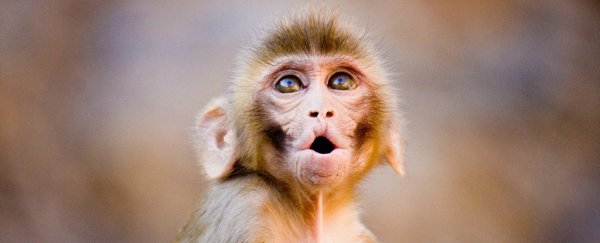A new type of antibody therapy appears to have completely blocked the primate equivalent of HIV in infected monkeys.
More than two years after the treatment, the monkeys are now drug free, have no symptoms, and there are almost no traces of the virus in their systems. The results are so impressive that clinical trials have already begun with human patients in the US.
"We have good reasons to believe that the therapy will work similarly in humans," said lead researcher Lutz Walter from the German Primate Centre in Göttingen. "It would be a breakthrough for the future treatment of HIV patients."
In the trial, rhesus macaques infected with simian immunodeficiency virus (SIV) - the primate version of HIV - were given a standard antiretroviral drug for 90 days, before being treated with an antibody called Vedolizumab for 23 weeks.
After completing the therapy, all monkeys showed sustained control of the infection, and there were almost no traces of the virus in their blood or gastro-intestinal tissues.
Impressively, two years later, the "viral load remained low, the immune system intact, and the rhesus macaques healthy", a press release explains. The monkeys, for now at least, are in "sustained remission".
"This finding could become a blueprint for an alternative therapy for HIV, which could make it so someone would not need to continuously take antiretroviral drugs," said one of the researchers, Aftab Ansari, from Emory University School of Medicine and Yerkes National Primate Research Centre in the US. "It could also help us craft more effective vaccines."
Once HIV infects someone, it immediately hides in their gut, hijacking a group of immune cells called CD4+ T-cells and using them to replicate itself and spread around the body.
Antiretroviral drugs are already the most common form of treatment for patients with HIV, and taken regularly, they can help to keep this infection under control for decades . But they never remove HIV from the body altogether, so they have be taken permanently, and often cause side effects such as chronic inflammation, poisoning symptoms, and accelerated ageing.
That's why researchers are trying to combine this approach with the use of antibodies, to develop a treatment that's longer lasting.
Antibodies are a specific type of protein that our bodies produce in response to a certain antigen. They're the proteins used in vaccines that tell our immune systems "Hey, I recognise this virus and it's not good" - and researchers have spent years actively trying to develop antibodies that take down HIV.
But although there have been impressive results in the past, they've all been short-lived, and required ongoing injections of antibodies, because HIV is a master at hiding and disguising itself in its hosts.
Which is why this new approach is so promising.
"The aim of the study was to find a new therapeutic approach for the treatment of infections with immunodeficiency viruses, which would permanently prevent the proliferation of the viruses even after only temporarily application," said Walter.
To figure this out, the team took 18 rhesus macaques infected with SIV and gave all of them antiretrovirals for 90 days, before giving 11 of them Vedolizumab every three weeks, and seven of them a generic antibody to serve as a control group.
Three of the monkeys in the treatment group were discounted from the study because their immune system fought back against Vedolizumab, but the other eight went on to have the virus pretty much erased from their system - while still maintaining healthy levels of T-cells in the body. This means the drug wasn't just wiping out the immune system.
Barton F. Haynes, a Duke University immunologist who wasn't involved with the study, told the LA Times that the antibody "allowed animals to control the infection" on their own. "That's what was tantalising and surprising."
Even better, Vedolizumab is already used in humans in Europe and the US to treat inflammatory bowel diseases such as Crohn's disease and ulcerative colitis, so it doesn't need to go through the extensive safety testing that most new drugs would need to.
The antibody works by attacking a specific receptor on T-cells that are known to be susceptible to HIV infection - in inflammatory bowel diseases this helps to calm down an over-active immune response. And in monkeys with SIV, it seems to wipe out all the T-cells that HIV is hiding in, while leaving healthy ones intact.
More research is needed to be done now to verify exactly what Vedolizumab is doing to infected T-cells, and extensive clinical trials will have to take place before we know whether this works in humans.
But so far, it's looking pretty promising. And Phase I clinical trials testing the same combination of Vedolizumab and antiretrovirals in 15 HIV-infected humans have already begun in the US, with the researchers looking to extend them to more countries soon.
The research has been published in Science.
